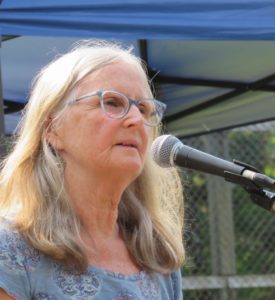WELLFLEET — Voters at Saturday’s special town meeting adopted two zoning bylaw changes intended to create more year-round affordable dwellings in town. Both articles had been proposed by select board Chair Ryan Curley and endorsed by an array of other town officials, but they were firmly opposed by contractor Gerry Parent, the longtime chair of the Wellfleet Planning Board.

Article 16, to allow the year-round use of small cottages previously restricted to use only during the months of April through November, provoked the longer discussion.
Parent, who was allowed by Moderator Dan Silverman to introduce the article even though the planning board had not sponsored it, proceeded to argue against its adoption. He raised a series of objections to the change: that it would require expensive Title 5 upgrades to the cottages’ septic systems; that it would lead to a torrent of applications to expand the cottages and greatly increased intensity of use; that there would be too little parking; that homeowners’ associations wouldn’t allow conversion to year-round use; that “more than 65 percent of the cottages are within the Wellfleet Harbor watershed”; and that it wouldn’t alleviate the shortage of affordable housing in town because the price of the cottages would skyrocket once year-round use was allowed.
The planning board, at an Aug. 17 public hearing, had voted 4-3 against recommending the amendment.
After Parent’s litany of opposing arguments, Curley was allowed to give his reasons for proposing the amendment. “I’m the presenter of this article,” he noted, “not the planning board. Currently, cottages are not allowed to be occupied from December through March. This changes the definition to allow them the possibility of year-round use.”
Curley said that about 150 units not located in the National Seashore zoning district would be affected; the change would not apply to properties inside the Seashore.
He acknowledged that the price of cottages on the water would rise, “but plenty are not on the water,” he said. “They are affordable to buy and would most likely be affordable to rent. What’s the harm in allowing it? The intensity of use in the summer far outweighs what would be a small family occupying a home year-round. It’s much better to spread out the use over a wider period and in the winter, when water levels are higher.”
Only 20 percent of Wellfleet’s housing stock is currently occupied year-round, Curley said, adding, “Restricting units to seasonal use is counterproductive.” Referencing Parent’s statement about the percentage of the cottages in the harbor watershed, Curley said, “Ninety-five percent of Wellfleet is within the harbor watershed.”
Curt Felix, a member of the board of water commissioners, downplayed Parent’s argument about forcing cottage owners to upgrade septic systems. “Title 5 is now obsolete,” Felix said. “Going forward, these systems are going to get upgraded” regardless of whether the cottages are used seasonally or year-round.
Felix noted that the bylaw change had been championed by the late Roger Putnam, a former selectman and chair of the zoning board of appeals. “This is something he was fighting for a long time ago,” he said. “I’m glad to see it.”
Select board member John Wolf said the septic system question was “a nonissue,” and his fellow board member Michael DeVasto called Parent’s argument “a red herring.”
Housing authority Chair Elaine McIlroy argued for the zoning change, saying, “I know several young people who have been able to buy one of these units. They have to move out in the winter. It’s a crazy situation. The whole world is talking about tiny houses, and there are funds to help first-time home buyers and to help with repairs. We’re going to give a handful of people a chance to live here year-round.”
“What’s wrong with letting people put sweat equity into fixing up these houses?” asked Stephen Greenberg.
The article needed a two-thirds majority to pass; the vote, by a show of voter cards, was so one-sided that the moderator did not need to call for a count.
The same outcome followed the discussion of Article 18, to amend the zoning bylaw to reduce the minimum size of building lots for affordable houses.
Once again, Parent introduced the article with a speech opposing it, although, in this case, his board had voted to recommend the change, 4-3.
“I was one of three that voted against it,” Parent said.
Curley followed up with the observation that “this is the first time the planning board has voted in favor of a proposal and issued a negative report.” He called the amendment “a perfect opportunity to build some affordable homes.” There are 18 lots in town that would probably become eligible for the construction of deed-restricted houses, said Curley; another 22 parcels might be affected. “This is not a huge change,” he said. “We have 3,700 residential units in Wellfleet. This might add 20 relatively modest homes with minimal wastewater impact.”
“When we pass zoning bylaws, we have to enforce those zoning bylaws,” Parent told the meeting. “We haven’t, unfortunately, looked at those and corrected the problems that arise. But you are the final vote. We don’t take it personal. We’ll work around whatever you vote for.”



